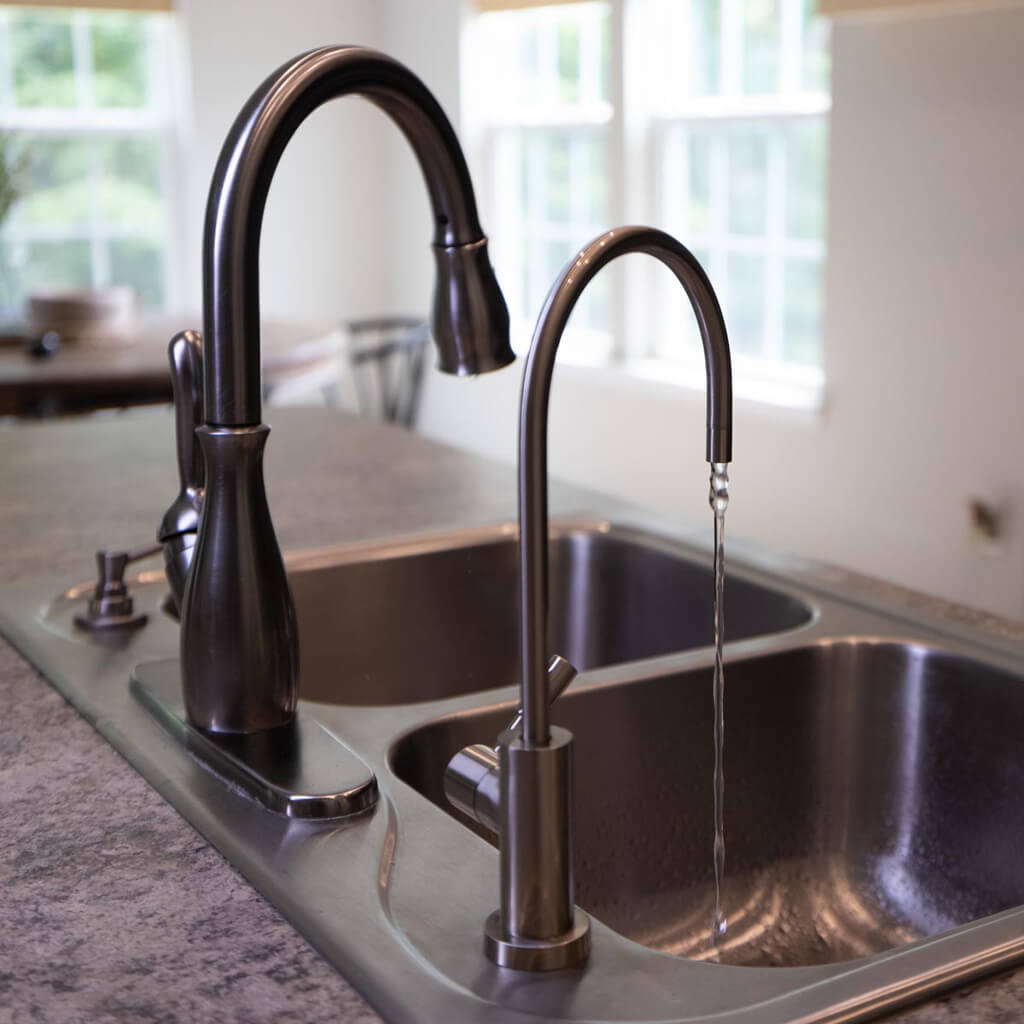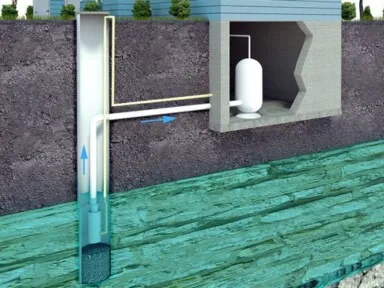Depending on where you live, you have city water or well water. Why does this matter? Since water is essential for a healthy life, where you get your drinking water is very important. While many people have preconceived notions about well water and city water, both can be great options. Let’s look at the differences between city water vs well water, the pros and cons of both, and how to treat your water.
The Difference Between City Water & Well Water
There are two possible sources for your water, city water and well water. Let’s take a look at the differences.
City Water
Do you get a monthly water bill? Then you have city water. The city collects your water from a water source, purifies and filters it, and routes it into your home through a pipeline system. City water is the most common type of water to have if you live in the US. Over 280 million Americans rely on their city to deliver safe drinking water to their homes. According to the CDC, 0.8% of community water systems provide water for 82% of the U.S. population.
City Water: Pros
- City Manages Maintenance & Delivery
One pro of city water is the EPA regulates your water safety. So you can rest easy knowing your water is tested for safety daily. City water also has added nutrients in it, like fluoride and chlorine. Chlorine kills disease-causing germs like norovirus and Salmonella. In comparison, fluoride is a safe and cost-effective way to prevent tooth decay and cavities. Many people prefer city water for the convenience factor alone. - Available in Most Places
Unless you live in a rural area, there is a good chance you have city water at your home. You simply have to ask the city to turn it on to access your water supply. - Increase Home Value
Well water can be unpredictable for many reasons – the well dries up, contamination, and faulty equipment. Many banks will offer better loan rates to homeowners with city water for this reason.
City Water: Cons
- Not As Fresh As Well Water
City water is collected from run-off and surface water, containing more pollutants and contaminants. The filtering process removes nutrients and minerals that give it a less-than-fresh taste. Even with daily testing and adding minerals and nutrients, contaminants can still find their way into the water supply through old pipe systems. - High Cost
Another downside of having city water is the cost. Water bills are increasing in some areas due to the amount of pollution. The more pollution in the water, the more expensive it is to clean and filter. While having someone else manage your water treatment is convenient, it has become expensive. Along with high costs comes the potential to miss monthly payments. The city may turn off your water supply if you cannot pay your water bill. - Widespread Contamination
Large-scale natural disasters like floods and hurricanes can cause mass-scale contamination of city water. It can take days or even weeks to clean the water, pipes, and equipment, so the water is safe. That’s why it is essential always to follow any water boiling advisories. - Hard Water
Depending on your city, your water can be hard or soft. Hard water is water with a high level of minerals suspended in it, namely calcium and magnesium. While these minerals are not inherently dangerous, they create scale or residue buildup in your pipes and appliances. They can also cause issues in your beauty routine. Installing a custom water softener or water conditioning system can easily fix your hard water problems.

Water Treatment Options For Every Home
At Leaf Home Water Solutions, we offer the most comprehensive selection of water treatment products anywhere. With conditioning, filtration, softening, and more, our team is able to correct water chemistry in homes with municipal water and private wells alike.
VIEW OUR PRODUCTS!
Well Water
Homes supplied by well water get drinking, bathing, and cleaning water from a private well on the property. Wells are built by drilling into the ground and accessing an underground aquifer. Then water is pumped into the house. Well water is most common in underdeveloped areas. Nearly 15%, or about 43 million people, in the US rely on wells for their water source. Typically, well water requires less purification treatment than city water.
Pros of Well Water
- No Water Bill
Unlike city water, those with well water are lucky not to get a water bill. And if you’re using a septic system, you won’t have a sewer bill either. Fewer bills mean saving money. - Fresher Taste & More Minerals
Though taste is relative, most people agree that well water tastes better than city water. Well water comes from deep in the ground providing higher nutrients and a fresher look. The underlying soils and rocks naturally filter the water. The higher mineral count makes the water taste better and benefits human health. - Not Affected by Natural Disasters
Natural disasters can interrupt the city’s ability to provide clean, healthy water. Unlike city water, well water is not typically affected by this issue unless the natural disaster is very severe.
Cons of Well Water
- Needs Electricity
Pumps move the water through the ground and to your home. If you lose electricity, you won’t have a working water pump. And if the pump malfunctions or develops a fault, it will need to rely on a generator or solar power. - Responsible for Water Quality & Maintenance
While not having to pay a water bill is great, it also means that you are responsible for maintaining your well. The EPA does not test private well water, so you are solely responsible for the quality of your water supply. You will need to regularly test for bacteria, viruses, and other contaminants like pesticides. Also, you’re responsible for drilling, repairs, and maintenance. Repairs can get costly. So it’s not necessarily cheaper to have well water. - Can Become Contaminated
While well water typically has more minor contamination issues than city water, it can still become contaminated. Harmful chemicals, bacteria, dead animals, and sewage are all possible contaminants. Nearby septic systems can also pollute the well, especially if there is a leak. If you notice your water looks cloudy or has a foul taste, you should test for water contamination. - Hard Water Problems
Like city water, well water can also be hard water. Common problems caused by hard water include feeling a residue on your skin after washing hands or bathing, soap scum on dishes, the necessity of more soap or detergent to clean household items, and the buildup of scale (solid deposits of minerals like calcium carbonate) in appliances like dishwashers, water heaters, and pipes. Even coffee pots can experience scale buildup.
How to Treat Home Water
Whether you have city or well water, make sure to test your water regularly. If you have city water, you can call your water supplier and ask for your water to be tested. Additionally, all municipalities are required to release an annual water quality report that the public can access.
If you have well water, you must regularly test your water. You can use an at-home water kit, available at most home improvement stores. Another option is to have a professional water specialist come to your home and test the water. Or you can send your water to a laboratory for testing.
You can choose the best treatment option to address your home water needs based on the results. Water treatment options are available at every price point, from water softeners and whole-house water filter systems to countertop drinking filters.
In Conclusion
Well water and city water differ in cost, quality, and convenience. Which option you choose will depend on your preferences and availability. Most urban areas only offer city water.
Remember, both city water and well water are susceptible to contamination. Installing a well water treatment system can help keep your water safe and tasting fresh. If you want to learn more about Leaf Home Water Solutions’ whole-home water treatment systems, call our water experts at 888-701-5497.
Editor’s Note: This post was originally published in March 2021 and has been completely revamped and updated for accuracy and comprehensiveness.



